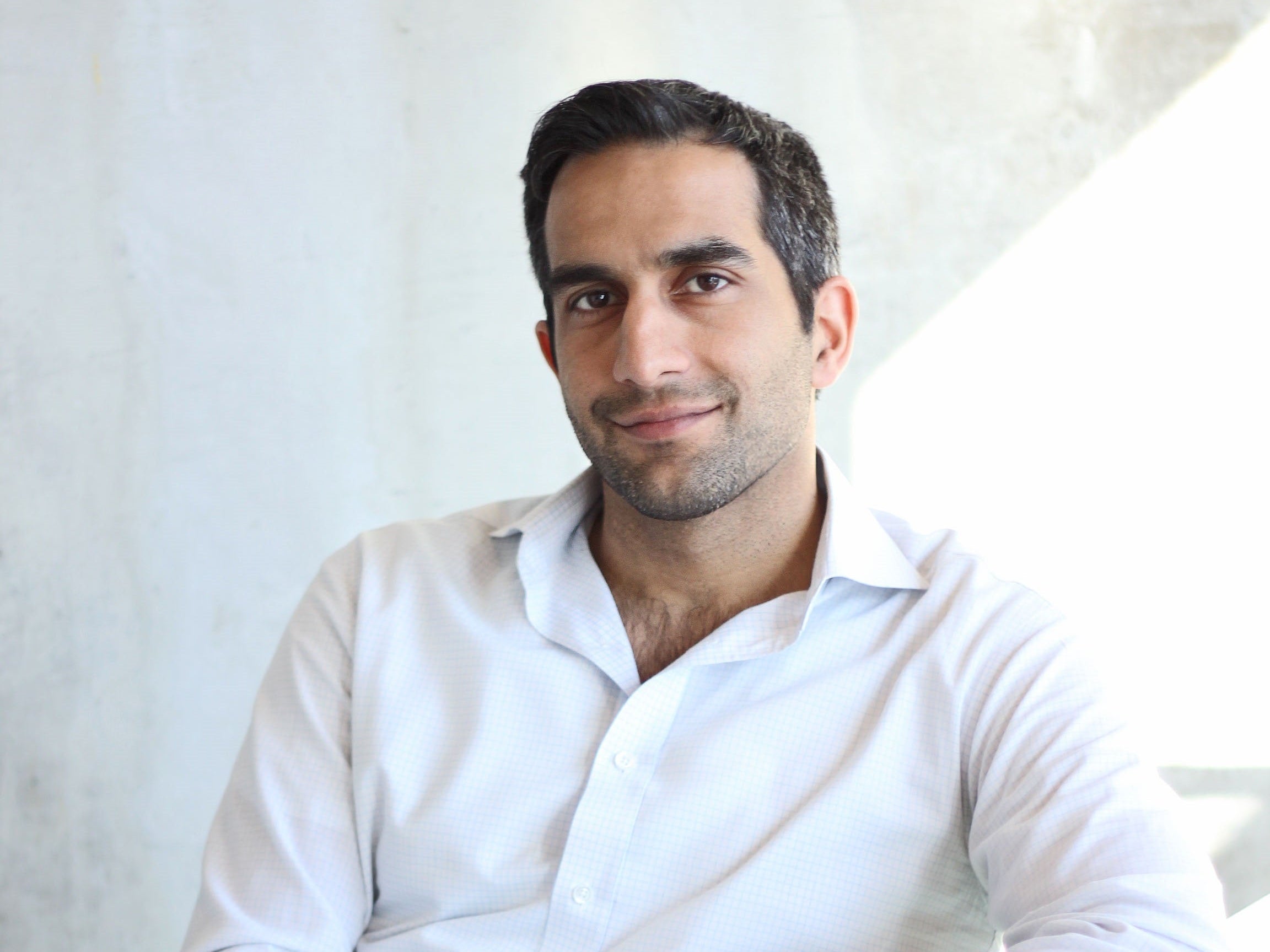‘It’s moving deckchairs on the Titanic’: Former BlackRock sustainability executive says Wall Street’s green investing is ‘PR spin’
Tariq Fancy, who served as chief investment officer of sustainable investing at the world’s largest asset manager, tells Louise Boyle the practice has little impact on reducing greenhouse gas emissions


Your support helps us to tell the story
From reproductive rights to climate change to Big Tech, The Independent is on the ground when the story is developing. Whether it's investigating the financials of Elon Musk's pro-Trump PAC or producing our latest documentary, 'The A Word', which shines a light on the American women fighting for reproductive rights, we know how important it is to parse out the facts from the messaging.
At such a critical moment in US history, we need reporters on the ground. Your donation allows us to keep sending journalists to speak to both sides of the story.
The Independent is trusted by Americans across the entire political spectrum. And unlike many other quality news outlets, we choose not to lock Americans out of our reporting and analysis with paywalls. We believe quality journalism should be available to everyone, paid for by those who can afford it.
Your support makes all the difference.The former chief investment officer of sustainable investing at BlackRock, the world’s largest asset manager, says Wall Street is duping the public with flawed financial products dressed up in “PR spin” which claim to have a positive impact on the climate emergency but are little more than a “deadly distraction” to real, systemic change.
The green finance market is booming thanks to government pledges of a low carbon recovery from Covid-19, along with increasing commitments to reach net-zero emissions in the coming decades.
Sustainable investing incorporates so-called Environmental, Social, and Corporate Governance (ESG) principles into financial decisions; for example, how a corporation treats employees or what it’s doing to reduce pollution.
But former BlackRock executive Tariq Fancy told The Independent that ESG funds, which have a combined value of more than $1 trillion, cause little impact on reducing the planet-heating emissions that are barreling us towards a climate emergency, and that Wall Street is “greenwashing the economic system”.
“There’s an impetus in large companies to build a green product that gets maximum marketing value with minimal change to the underlying structure,” Mr Fancy said, drawing parallels with strategies of the tobacco and fossil fuel industries.
Mr Fancy claimed that some existing mutual funds have been rebranded as “green” with little effort to ensure they were.
Read more:Trawling ocean floor for fish has carbon footprint equivalent to global aviation
UK ‘halfway to net zero’ due to dip in emissions, analysis reveals
Why climate change is a feminist issue
He also said that some funds, with a dedicated sustainability mission, can include fossil fuel companies and other corporations with heavy carbon footprints, like fast-fashion brands. Regardless, it’s of little consequence, he said.
“It almost doesn’t matter whether an ESG fund has an oil major in it or not,” he said. “It’s all moving deckchairs on the Titanic. The fundamental problem is the entire system doesn’t work. The reality is it doesn’t pay to be responsible.”
Mr Fancy spent two decades working in investment banking and private equity including at Credit Suisse First Boston and a spin-off fund from Carl Icahn Holdings. He went on to be a principal at the Canada Pension Plan Investment Board before joining BlackRock in 2018 as CIO of sustainable investment.
“I went in as an absolute believer that this was the way to reward better companies, where the gears of capitalism kick its own shortcomings,” he said.
BlackRock has $8.7 trillion in assets under management, through 401(k) plans, exchange-traded funds (ETFs) and mutual funds, giving it a majority stake in some of the most impactful companies on earth. By one estimate, BlackRock currently has $200bn in sustainable investment assets.
And with that vast influence, the company, and its founder, chairman and CEO Larry Fink, has positioned itself as the eco-warrior on Wall Street.
Mr Fancy described BlackRock as out in front on sustainability “compared to what competitors were doing” and said the people working on the issue at the company are “good people who believe they’re doing the right thing”.

During his time there, Mr Fancy helped integrate ESG principles broadly across investing and worked on new “green” financial products. He said that BlackRock clients increasingly asked how ESG investing was “making the world a better place”.
“There was no answer for it,” he said.
He illustrated by pointing to the focus on “climate risk” in investment portfolios. This was “blindly treated by most as a way to fight climate change, even though protecting investment portfolios against the carnage of climate change is not the same thing as stopping that carnage from occurring in the first place”.
He said that at the root of the problem is that “most of the economy consists of transactions in which people make decisions with other people’s capital, whether BlackRock deciding where to invest the pensions assets of California’s public employees or a senior manager at Amazon deploying capital on behalf of public shareholders”.
He added: “In those situations, I saw firsthand that they are almost always financially incentivised and legally obligated to focus on economic value first and foremost, and in most cases can only consider activities purely for social good if they don’t cost anything.”
He said that he had seen no evidence that buying a low-carbon ETF, for example, led to lower emissions.
In a statement, BlackRock told The Independent that the company believes “greenwashing is a risk to investors and detrimental to the asset management industry’s credibility, which is why we strongly support regulatory initiatives to set consistent standards and increase transparency for sustainable portfolios”.
The statement continued: “In the last year, BlackRock has clearly stated that climate risk is investment risk and articulated the investment implications of other sustainability factors. That’s why BlackRock has integrated sustainability into our investment process.
“We have also launched a range of new funds that help clients meet their sustainable investing goals, including ETFs that remove all fossil fuel exposure along with palm oil and other controversial industries; we’re also introducing analytical tools to calculate the climate risk embedded in investment portfolios and partnering with institutional clients to invest in renewable infrastructure around the world.”
Mr Fancy left BlackRock in late 2019 to take on family business obligations following the death of his father-in-law. He said that he left the company “on very good terms”.
And while BlackRock had given him high-level, first-hand experience of how green investing works, he says his intention was not to single them out, as ultimately the problem is systemic.
While at BlackRock, Mr Fancy said he believed that the environmental impact of green investing was overblown but “harmless and aspirational”.
“I thought of it like giving wheatgrass to the cancer patient,” he said. “It’s well-marketed and sounds nice but there’s no reason to believe it’s going to stop the cancer.”
But he said that his opinion changed last year as Covid-19 took hold and he now believes Wall Street is doing “active harm”.
“We needed to bend the curve of the [Covid] infection rate and did it with science and government action. And yet when scientists tell us we need to bend the curve on greenhouse gas emissions, suddenly the free market is good enough? That is a position that needs to be open to public debate.”
Since the 2008 financial crisis, BlackRock CEO Larry Fink has written a highly anticipated annual letter to fellow business leaders. Amid the chaos and climate denial of the Trump administration four years ago, he wrote that “society increasingly is turning to the private sector and asking that companies respond to broader societal challenges”.
In his 2021 letter to CEOs, he upped the ante by issuing a stark warning that “climate risk is investment risk”, and dubbed the climate transition “a historic investment opportunity”.
He also called on companies to follow recommendations from the Task Force on Climate-related Financial Disclosures (TCFD), as BlackRock has done.
“Given how central the energy transition will be to every company’s growth prospects, we are asking companies to disclose a plan for how their business model will be compatible with a net zero economy – that is, one where global warming is limited to well below 2C, consistent with a global aspiration of net zero greenhouse gas emissions by 2050,” he wrote.
He added that BlackRock “strongly supports” a global standard of disclosure, urging “companies to move quickly to issue them rather than waiting for regulators to impose them”.
Mr Fink, who has a personal fortune of around $1bn, also told Bloomberg that he “prefer capitalists self-regulate” on climate impacts.
“I’m a believer that capitalism understands this and we’re moving forward. We’re moving forward because it’s good for business,” he added.
Yet disclosing risk doesn’t necessarily halt action that destroys the planet.
Mr Fancy said that he views such statements as irresponsible. “He’s using his pulpit to spread a set of ideas that are invariably going to delay regulation,” he said.
Wall Street titans benefit the most from the status quo, the former BlackRock exec said, pointing to the banks’ bailout from the 2008 financial crisis. “Someone’s going to be left holding the bag, and it’s going to be the public once again. This time specifically the youngest and the poorest in society,” he said.
He likened Wall Street’s actions to Big Tobacco and Big Oil’s deceptive marketing strategies “every time the public realises that a set of lucrative business activities are hampering the long-term public interest”.
Mr Fancy, who now runs digital learning start-up the Rumie Initiative, has undertaken a research project on sustainable investing in the US and Canada with Toronto’s Ryerson University.
He said the results revealed that in the US, after being shown headlines about corporate do-gooding on the environment, people were 17 per cent more likely to say business - not governments - will lead the way to a sustainable future.
Joe Biden has made climate a key focus of his administration. In a twist, the president is being advised on climate and energy by senior advisor Brian Deese, previously BlackRock’s global head of sustainable investing and Mr Fancy’s former boss.
Mr Fancy described Mr Deese as “one of the smartest and most hardworking people I’ve ever met, with a lot of integrity”.
He added: “It’s a good thing that Brian is there because it’s wind on the sails of an administration that believes in science.”
Earlier this month, the US Securities and Exchange Commission (SEC) took the unprecedented step of establishing an enforcement task force to examine misconduct related to ESG issues, as the regulator stepped up to Mr Biden’s “whole of government” approach to climate.
It’s been more than a decade since the revered British economist Sir Nicholas Stern described climate change as the “greatest market failure the world has seen”. Since then he, and fellow economists such as Nobel laureate Joseph E. Stiglitz, have argued for policies like placing a high price on carbon pollution.
Mr Fancy said that he had come to believe that effective, top-down government regulation would be the only way to tackle the climate crisis and that he hoped by speaking out on green financing, it would become part of a larger public debate.
“It would be better in the long run if these companies did nothing, rather than giving the impression that they have it under control,” he said.
This article has been updated to reflect Mr Fancy’s correct role at the Canada Pension Plan Investment Board
Join our commenting forum
Join thought-provoking conversations, follow other Independent readers and see their replies
Comments